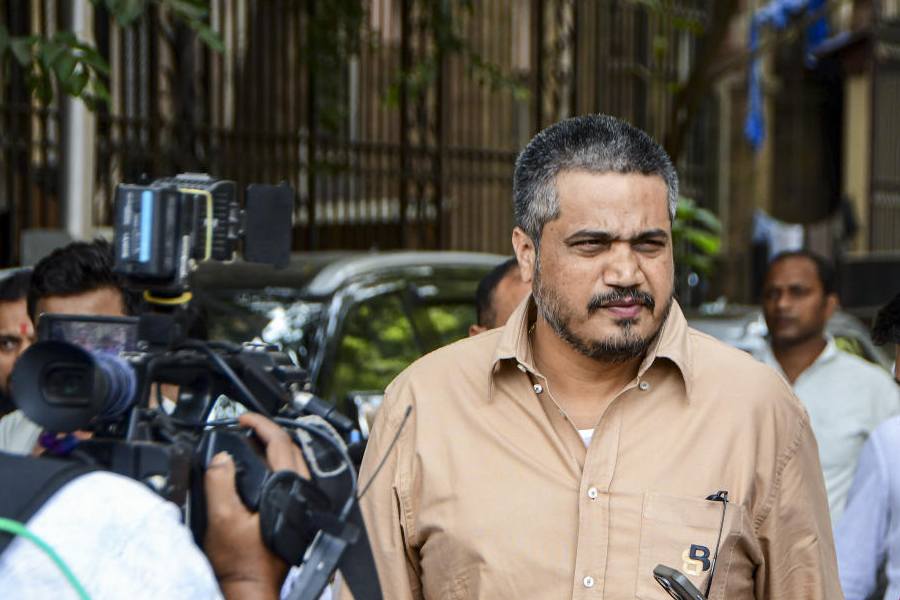 |
| REALITY BITES: A scene from Gandhi, My Father (top) and Maine Gandhi Ko Nahin Mara (above) |
The place: an air-conditioned crowded tent at Gandhi Smriti in Delhi. The occasion: the launch of yet another Gandhi book — the Academic Foundation’s Gandhian Way: Peace, Non-Violence and Empowerment. “Everybody’s milking Gandhi dry,” sniggered a member of Thursday’s audience.
The launch — by Prime Minister Manmohan Singh with Congress president Sonia Gandhi and Congress bigwigs in attendance — came a week after the release of the critically acclaimed film Gandhi, My Father. In January, two books by Mahatma Gandhi’s descendants came out within 15 days of each other.
There are others headed for the printers. Later this year, Oxford University Press (OUP) will publish a book edited by Gopal Krishna Gandhi, West Bengal Governor and Gandhi’s grandson. HarperCollins has pitched for India selling rights for Kathryn Tidrick’s Gandhi: A Political and Spiritual Life, first published in November 2006 by I.B. Tauris. And Rupa Publications will soon reprint Thomas Weber’s On the Salt March, first published in 1997. The Gandhi cottage industry certainly seems to be thriving.
But what it’s churning out isn’t exactly lily-white images of Gandhi. Books and films are daring to depict Gandhi as just another man — eccentric, egocentric and a mite selfish. Rajmohan Gandhi went into details of his romantic relationship with Saraladevi, Rabindranath Tagore’s niece, in Mohandas. Gopal Gandhi’s book, OUP managing director Manzar Khan promises, will look beyond the plaster cast image of Gandhi, drawing upon his diary entries, letters and conversations.
It isn’t just family that is going beyond the legend. Biographers and historians too are taking a more candid look at Gandhi. Tidrick, says Harper Collins CEO P.M. Sukumar, shows Gandhi as a difficult and self-obsessed man who believed that changing the world was his destiny. The book, he says, also deals with his ideas about the relationship between sexual temptation and spiritual power, and the bizarre and scandalous behaviour that resulted.
It’s a slightly different story on the silver screen. Gandhi, My Father is the only film that has dared to depict the darker side of Gandhi, focusing on the troubled relationship he had with his eldest son, Harilal. There have been only two other films with Gandhi as the central character — Richard Attenborough’s Gandhi and Shyam Benegal’s Making of the Mahatma. Both of them were political — and adulatory — biopics. No wonder great-grandson Tushar Gandhi calls Gandhi, My Father pathbreaking. That’s also the term he uses for Lage Raho Munnabhai, the first film to be irreverent about Gandhi.
Munnabhai was a breezy entertainer but there are other serious films taking pot shots at what is often described as the hypocrisy around Gandhi. In debutant director Abhik Bhanu’s Sab Kuch Hai Kuch Bhi Nahin, a writer wants to make it big by penning a controversial book on Gandhi. Vijay Ghatge’s Shobhayatra shows a local don organising a procession of assorted lowlifes dressed up as national figures. The man who plays Gandhi is a goon with underworld contacts. When the film was released in 2005, Ghatge said, “The play on which the film was based had a strong social message.”
In early 2006, Senior India, a newly launched magazine from Muzaffarpur, published a feature called ‘Mahatma and His Girls’ (with the Hindi version titled ‘Bapu ki vasna’ (Bapu’s desires).
So why has Gandhi suddenly become fair game? It’s not entirely new. The Saraladevi-Gandhi relationship was first mentioned in Rajmohan Gandhi’s 1995 book The Good Boatman. Harilal Gandhi’s granddaughter, Nilam Parikh, wrote Gandhijinu Khovayelu Dhan: Harilal (Gandhi’s Lost Jewel: Harilal) in 2001. In 2005, Uma Dhupelia-Mesthrie’s Gandhi’s Prisoner: The Life of Gandhi’s Son Manilal dealt with his relationship with his second son.
Says Thomas Abraham, president and CEO of Penguin India, “Most biographies have now moved from straight hagiographies to a more thoughtful reappraisal. Authors are now treating subjects the way a novelist would, moving away from a linear narration to a more layered approach.”
But it seems confined to Gandhi and doesn’t extend to leaders such as Nehru. Books touching upon Nehru’s love life have been written only by foreign authors. That’s natural, says one publisher. Unlike Gandhi’s descendants, Nehru’s family is still riding on his political legacy and needs to preserve a self-sacrificing image, he elaborates.
Rajmohan Gandhi feels that the candidness about Gandhi is natural. “As a worshipper of truth, which Gandhi was, he demands the frankest scrutiny of his own life,” he had told Outlook in January when the book was released. Besides, with so much having been written about his political life and philosophy, any new author, says Sukumar, would want to be different.
There’s also, some hold, more tolerance in society. There was nary a whimper in 2004 when Sudhir Kakkar dared to fictionalise the relationship between Gandhi and his disciple Madeline Slade (Mira) as a romance and titled it, Mira and the Mahatma. “People are more free about interpreting Gandhi,” says Tushar Gandhi. But he adds, “This freedom is also abused because Gandhians are more tolerant.”
Up to a point, maybe. Rajmohan Gandhi has admitted that he has been ticked off by relatives and Gandhians for mentioning Saraladevi in The Good Boatman. Razi Ahmed, secretary of the Gandhi Sangrahalaya in Patna, has often objected to Gandhi’s depiction in books, films and the media and sought to stop the screening of Gandhi, My Father. But his opposition has been confined to issuing statements and asking the government to intervene. “Gandhi’s followers won’t blacken people’s faces or burn books,” he says.
So the open season on Gandhi is here to stay perhaps.









